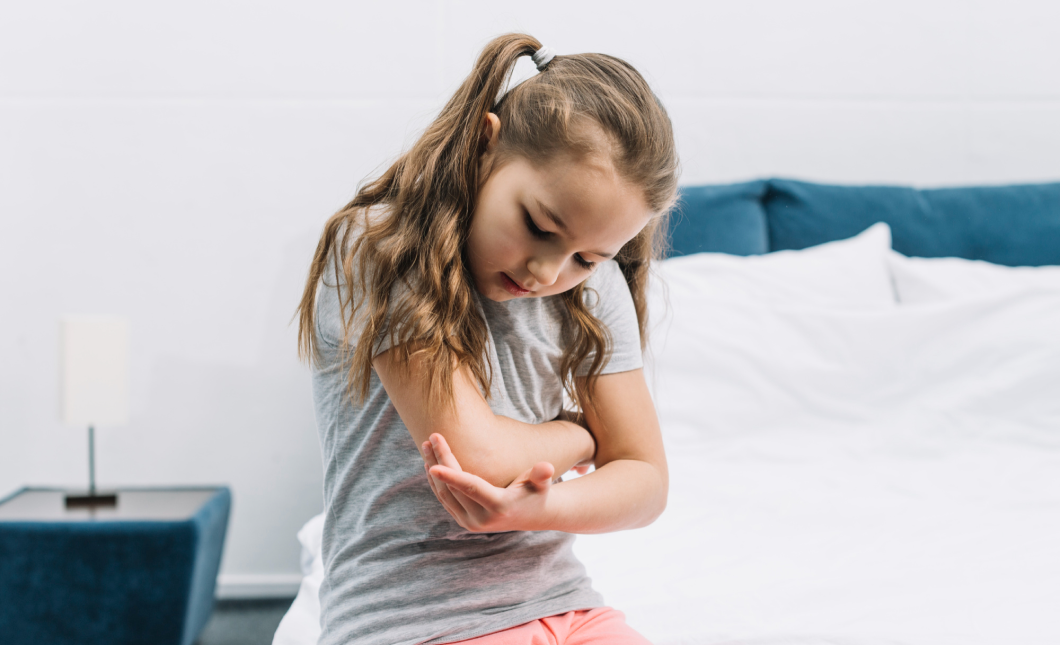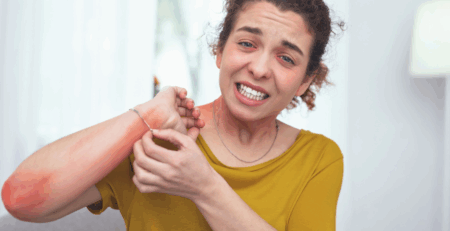More Than Just Dry Skin: A Homeopathic Perspective on Eczema
Kavya, an eight-year-old with bright eyes and boundless curiosity, had been dealing with recurring skin rashes since early childhood. Her parents were initially told it was “just dry skin,” but as the years passed, the rashes worsened—becoming red, inflamed, and unbearably itchy. She would often scratch until the skin cracked and bled, leading to infections and sleepless nights. Steroid creams offered only temporary relief, and the eczema kept coming back. Frustrated by the cycle of flares and creams, her parents turned to homeopathy for a deeper, gentler solution.
Eczema, or atopic dermatitis, is a chronic skin condition that results in dry, itchy, and inflamed skin. It often begins in infancy or early childhood but can appear at any age. Though not contagious, eczema has a strong impact on quality of life—interfering with sleep, confidence, and daily comfort. It often coexists with other allergic conditions such as asthma, nasal allergies, or hay fever.
What Causes Eczema?
The exact cause of eczema is not fully understood, but it’s believed to result from a combination of genetic and environmental factors.
- A family history of eczema or other allergies(like asthma or allergic rhinitis) increases the risk.
- Many people with eczema produce insufficient filaggrin, a protein essential for maintaining healthy skin moisture.
- The skin becomes more vulnerable to irritants, allergens, and infections.
Common environmental triggers include:
- Soaps, detergents, and cleaning products
- Dairy, nuts, eggs, wheat
- Dust mites, pet dander, synthetic or wool fabrics
- Low humidity, cold weather, excessive sweating
- Emotional stress or mental strain.
Types of Eczema
Eczema is not a single disease but a group of related conditions, each with distinct characteristics. The most common form is atopic dermatitis, which typically begins in early childhood and is associated with a genetic tendency to develop allergic conditions like asthma or hay fever. In infants, the rash commonly appears on the cheeks and scalp; in older children, it tends to affect the bends of elbows and knees, wrists, and ankles. Adults often develop rashes in the same areas, but more widespread involvement can occur.
Another form, contact dermatitis, is triggered when the skin comes into contact with allergens (such as metals or cosmetics) or irritants (like bleach or detergents). This can result in localized redness, itching, or even blistering. Seborrhoeic dermatitis affects the scalp, face, and eyelids, and appears as flaky, greasy patches; in babies, it’s referred to as “cradle cap.” Dyshidrotic eczema is characterized by small, fluid-filled blisters on the palms and soles, which can be quite itchy and uncomfortable. Venous (stasis) eczema typically affects the lower legs in individuals with poor circulation or varicose veins and may be accompanied by swelling or the risk of ulcers.
How Is Eczema Diagnosed?
Diagnosing eczema is primarily clinical. A doctor usually identifies it through a careful examination of the skin and a review of the patient’s medical and family history. If eczema runs in the family, this greatly supports the diagnosis. No specific lab test is typically required, although in certain cases, a patch test may be conducted to detect allergies that might be triggering flare-ups. In this test, small amounts of potential allergens are applied to the skin to observe for reactions. This helps pinpoint environmental or chemical triggers that may be aggravating the eczema.
Homeopathy for Eczema: A Deep-Acting Cure
Homeopathy offers an outstanding and holistic treatment approach for eczema. Rather than merely addressing the skin’s surface, homeopathy focuses on restoring balance to the internal immune system, which is believed to be at the root of the disorder. Homeopathic remedies aim to reduce inflammation by optimizing the overactive immune response and supporting the repair of the skin barrier to retain moisture. Alongside healing the rash and eruptions, they are highly effective in managing accompanying symptoms such as itching, burning, dryness, pain, flaking, and even bleeding during flare-ups.
Importantly, homeopathy goes beyond short-term relief—it seeks to control the progression of eczema and treat the underlying cause, offering long-term healing rather than suppression of symptoms. This becomes especially relevant in cases where conventional medicine relies heavily on steroid creams, immunosuppressants, or hydrocortisone ointments. These topical agents only address the external signs and may push the disease deeper into the body, leading to more serious conditions such as asthma or other systemic issues. Homeopathy avoids this by healing from within.
Another strength of homeopathy lies in its safe and non-toxic nature, making it suitable for individuals of all ages—from infants to the elderly. The medicines are prepared from naturally occurring substances and are free from harmful chemicals or side effects.
Homeopathy also differs from conventional treatment in that it relies on internal, oral medicines rather than topical creams. The philosophy is simple: skin diseases are a reflection of deeper internal imbalances, and only a system that addresses the internal disturbance can bring about true healing. Once internal harmony is restored, the outward manifestation—eczema—gradually disappears as well.
A hallmark of homeopathic treatment is its individualized approach. The selection of the remedy depends not only on the physical symptoms but also on emotional characteristics, lifestyle, medical history, and constitutional tendencies. A thorough case-taking is done to understand the totality of symptoms, and the remedy is prescribed accordingly—taking into account potency, dosage, and repetition. Because of this precision, self-medication is strongly discouraged. Consulting a trained homeopathic physician ensures the remedy chosen aligns closely with the patient’s unique pattern of illness.
Lastly, homeopathic medicines provide relief without suppression. They do not merely silence the symptoms but work toward their resolution at the root level. Suppressing eczema can lead to more complex diseases later, often deeper within the body. Homeopathy, in contrast, aims for gentle, lasting, and natural cure—without pushing the illness inward.With homeopathy, healing is not just skin deep—it’s system deep
Common Homeopathic Medicines for Eczema
A variety of well-established homeopathic medicines are used to treat eczema, based on individual symptom patterns. For example, Graphites is effective when the skin is dry, cracked, and oozing, especially in skin folds or behind the ears. Sulphur is suited for intense itching and burning, particularly in warm individuals who scratch until bleeding. Petroleum works well when the skin is deeply cracked and bleeds easily, often worsening in cold weather. Mezereum is indicated when thick crusts form over the lesions and there is yellowish discharge with burning or intolerable itching. Rhus Toxicodendron is chosen when vesicular (blister-like) eruptions occur with great restlessness and itching. Calcarea Carb is helpful for slow-growing, chubby children who sweat excessively and tend to have recurrent infections. Natrum Mur is suited to emotionally reserved individuals with dry eczema along the hairline or in joint creases.
These remedies are not one-size-fits-all, and their selection requires the guidance of a trained homeopathic professional to ensure the best results.
❓ Frequently Asked Questions
- At what age does eczema usually appear?
Most cases begin before the age of five, but eczema can develop during adolescence or adulthood. - Which body parts are commonly affected?
In children, eczema often appears on the cheeks, scalp, and chest. In adults, it usually affects elbow folds, behind knees, and hands. - Why does my child have eczema?
Genetic factors play a major role. If either parent has allergies, asthma, or eczema, the child is more likely to develop atopic dermatitis. - Is eczema an allergy?
Not all eczema is allergic. Some forms are triggered by allergens, but others result from irritants, genetics, or immune imbalance. - Can eczema spread through contact?
No, eczema is not contagious. It does not spread from one person to another via skin contact. - Is eczema affected by weather?
Yes, eczema can worsen in cold, dry weather, although it can flare up in any season depending on individual triggers.
Final Thoughts
Eczema is far more than a surface issue—it is an expression of internal disharmony. While conventional medicine offers temporary control, homeopathy aims for lasting cure by healing from the inside out. Children like Kavya, and many others, have found relief and restored quality of life through individualized, safe, and effective homeopathic care. With the right guidance, freedom from itching, flaking, and inflammation is not just possible—it’s achievable.



